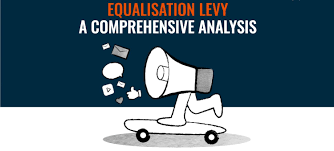
Disclaimer: Copyright infringement not intended.
Context:
- Equalisation levy (EL) imposed by India on the supply of services by multinational enterprises, is a sovereign right to tax revenues earned from operations in the country- Finance Ministry.
About:
- Equalization Levy (EL) is a tax leviable on consideration received by a non-resident for specified services.
- Equalisation Levy was introduced in India in 2016, with the intention of taxing the digital transactions i.e. the income accruing to foreign e-commerce companies from India.
- Equalization Levy is imposed under the Finance Act 2016 and not as a part of the Indian Income Tax Act, 1961.
- It is aimed at taxing business to business (B2B) transactions.
Applicability of Equalisation Levy:
- Equalisation Levy is a direct tax, which is withheld at the time of payment by the service recipient.
- The two conditions to be met to be liable to equalisation levy:
- The payment should be made to a non-resident service provider;
- The annual payment made to one service provider exceeds Rs. 1,00,000 in one financial year.
As per Sec 165 of Finance Act 2016, a person resident in India or a non-resident having a permanent establishment in India shall deduct EL at 6% on the consideration paid to non-resident towards specified services.
Services Covered Under Equalisation Levy:
Currently, not all services are covered under the ambit of equalisation Levy. The following services covered:
- Online advertisement
- Any provision for digital advertising space or facilities/ service for the purpose of online advertisement. As and when any other services are notified will be included with the aforesaid services.
EL (EQUALIZATION LEVY) 2.0:
- The Finance Act, 2020 expanded the scope of the EL to include all non-resident e-commerce operators providing ‘e-commerce supply or services.
- As per the expanded provisions, with effect from 01 April 2020, a non-resident e-commerce operator is liable to pay Equalization Levy at the rate of 2% on the consideration received/receivable from e-commerce supply or services.
Salient Features of (Equalization Levy ) EL 2.0:
- The Equalization levy 2.0 does not apply to transactions already covered by the Equalization Levy under Finance Act 2016.
- Thus, services such as online advertisement, provision of digital space for online advertising, or related services are not subject to EL 2.0.
- EL 2.0 is applicable on the online sale of goods or online provision of services or a combination of both by the non-resident e-commerce operator.
- EL 2.0 is applicable where non-resident e-commerce operators supply to
(a) person resident in India
(b) Person using an Indian IP address
(c) Non-resident in specific cases.
- Examples of specific cases where supply to a non-resident is subject to equalization levy are
(a) sale of advertisement to non-resident and such advertisement target Indian Resident
(b) sale of data to non-resident and the data targets Indian residents.
- The EL 2.0 shall be levied only if the aggregate amount of consideration for such specified services received in a previous year exceeds Rs. 2 crores.
- EL 2.0 is charged at the rate of 2% on the amount of consideration received/receivable by the non-resident.
- The non-resident e-commerce operator is liable for deposit the EL amount to the Government treasury & comply with the statutory requirements viz. the filing of EL return, etc. Thus, the onus of compliance cast on the non-resident e-commerce operator.
- EL 2 is not applicable where E-commerce operator has a Permanent Establishment in India and the e-commerce supplies or services are effectively connected with such Permanent Establishment.
E-Commerce Operator:
- E-Commerce operator means a non-resident, who owns, operates, or manages a digital platform or electronic facility for online sale of goods or online provision of services, or both.
E-Commerce Supplies / Services:
- Equalization Levy 2.0 applies to the following specified E-Commerce supplies or services
- Online sale of goods owned by the e-commerce operator; or
- Online provision of services provided by the e-commerce; or
- Online sale of goods or provision of services or both, facilitated by the e-commerce operator; or
- Any combination of the above-mentioned activities.
CLARIFICATIONS VIDE FINANCE ACT 2021:
- The Finance Act 2021 increased the scope of E-Commerce supply substantially for Equalization Levy purposes.
- It is clarified that e-commerce supply shall include one or more following activities undertaken online-
(a)acceptance of offer for sale
(b) placing of purchase order
(c) acceptance of purchase order
(d) payment of consideration
(e) supply of goods or provision of services, partly or wholly.
- The Finance Act 2021 has expanded the scope of Equalization Levy and bringing an array of business within its ambit.
- The equalization levy can now be levied on payment portals, takeaway sales, and other predominantly off-line businesses that require physical presence but allow online booking like travel, theatre experiences, or hotel stays.
- Now, e-commerce operators are to calculate equalization levy as a percentage of the entire consideration for supply collected by them, as opposed to the commission accruing to them. Thus, the levy would apply even where e-commerce operators do not charge a commission.
|
EL transactions are taxable as royalty or fees for technical services in India.
As the EL does not form a part of the Income-tax Act, 1961, tax credit is not allowed under the tax treaty for the EL paid in the source country and therefore it results in an additional cost to the business.
|
https://indianexpress.com/article/business/equalisation-levy-a-sovereign-right-not-a-unilateral-measure-fm-7805680/












